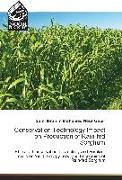Effectiveness of Mobile Cloud Technologies in the Field of Education
BücherAngebote / Angebote:
Mobile cloud technologies have revolutionized various industries by providing on-the-go access to vast computational resources and storage capabilities. In the field, these technologies have proven highly effective, offering numerous advantages:Enhanced Accessibility: Mobile cloud technologies enable field workers to access data, applications, and resources from remote locations using their mobile devices. This access to centralized resources improves productivity and decision-making on-site.
Scalability and Flexibility: Field operations often require scalability in computational power and storage. Mobile cloud technologies provide the ability to scale resources based on demand, ensuring that field workers have the necessary tools without being limited by device capacities.
Real-time Data Collection and Analysis: Field workers can collect and analyze data in real time using mobile devices connected to cloud-based platforms. This capability allows for immediate insights, aiding in faster decision-making and problem-solving.
Collaboration and Communication: Mobile cloud technologies facilitate seamless collaboration among field teams and with headquarters or off-site experts. Workers can share data, collaborate on projects, and communicate efficiently, fostering better teamwork and knowledge sharing.
Cost Efficiency: By leveraging cloud-based services, organizations in the field can reduce the need for expensive on-premises infrastructure and hardware. They pay for the resources they use, making it a cost-effective solution.
Improved Security and Data Management: Mobile cloud technologies often employ robust security measures, including encryption and secure access controls. This helps in safeguarding sensitive data collected in the field, addressing concerns about data breaches or loss.
Empowerment of IoT and Remote Devices: The integration of mobile cloud technologies with IoT devices and sensors in the field enhances automation, monitoring, and control capabilities, optimizing operations and reducing manual intervention.
Adaptability and Innovation: Continuous advancements in mobile cloud technologies offer opportunities for innovation in the field. New applications, tools, and services are regularly developed, enabling organizations to stay updated and competitive.
However, challenges persist:Connectivity Issues: In remote areas or locations with poor network coverage, accessing cloud resources can be challenging, impacting the effectiveness of mobile cloud technologies.
Data Privacy Concerns: Storing sensitive data in the cloud raises concerns about data privacy and compliance with regulations, necessitating robust security measures and compliance protocols.
Dependency on Internet Reliability: Reliance on internet connectivity for accessing cloud resources poses risks in cases of network outages or disruptions.
In conclusion, mobile cloud technologies have significantly improved field operations by providing accessibility, scalability, real-time capabilities, and collaboration tools. Despite challenges related to connectivity and data security, the effectiveness of these technologies continues to grow, driving innovation and efficiency in various field-based industries.
Folgt in ca. 10 Arbeitstagen




